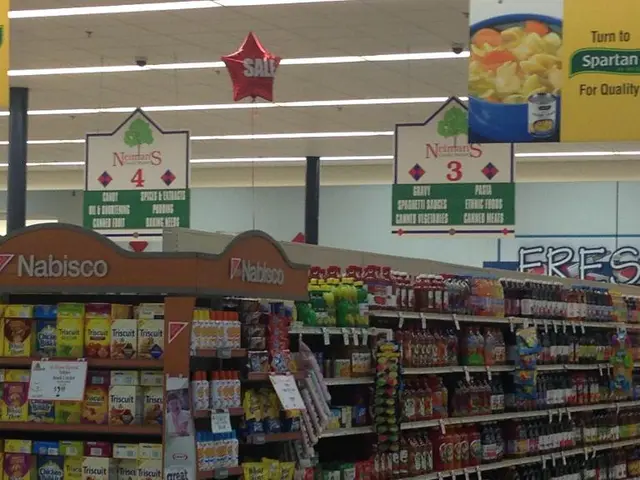Food Price Trends in Nigeria: A Mixed Bag of Relief and Challenges for May 2025
Cost of a Rice Sack, Beans, Fresh Tomatoes, and Other Essential Foodstuffs for This Week's Market Prices
Let's dive into the food market scene in Nigeria for the week of May 2025. Here's what's cooking:
Rice
- Long-grain foreign rice: Prices have taken a plunge, going from ₦95,000-₦100,000 to approximately ₦82,000-₦85,000 for a 50kg bag.
- Imported short-grain rice and local parboiled rice have also seen a drop, now priced at around ₦65,000 to ₦67,000 and ₦89,000, respectively.
Tomatoes and Pepper
- Tomatoes: A small basket now goes for ₦4,500, whereas a larger basket can set you back anywhere from ₦25,000 to ₦30,000. These high costs are due to off-season production, increased transportation costs, and post-harvest losses.
- Pepper: A small basket costs ₦2,500, up from ₦1,500-₦1,800 in recent weeks. A big basket will set you back between ₦15,000 and ₦20,000.
Beans
- The cost of beans has decreased across markets. In Kaduna State, a 100kg bag of white beans, which was previously priced at ₦160,000, now sells for approximately ₦88,000. Similarly, in Lagos markets, the price of a paint bucket measure of beans has dropped from ₦12,000 to ₦6,500.
Yam
- The influx of new yams into the market has led to reduced prices. In markets across Benue State, 10 tubers of yam, previously priced between ₦12,000 and ₦18,000, now sell for ₦10,000 to ₦15,000.
Other Grains
- Maize, Millet, and Sorghum: In Kaduna State, a 100kg bag of maize, which sold for ₦70,000 to ₦75,000 during the harvest period, now costs ₦47,000. The prices of millet and sorghum have similarly decreased, with current prices ranging between ₦50,000 and ₦51,000 per 100kg bag.
Palm Oil
- The price of palm oil has experienced a reduction. In Benue State, a litre of palm oil, which was previously priced at ₦2,500, now sells for ₦1,800.
Semovita
- The cost of semovita remains relatively stable. A 2.5kg pack is priced at ₦3,700, while a 12kg pack costs ₦12,300.
Beef
- What's cooking with the beef? Averages at ₦6,000 per kg, though prices can vary across markets.
Factors Impacting Food Prices
- Inflation: Nigeria's food inflation rate, while lowering slightly to 21.79% in March, remains in double digits, making affordability a concern.
- Fuel Prices: Increased fuel costs are pushing up transportation expenses for food distribution.
- Insecurity in Farming Regions: Banditry and conflicts, such as those in Kaduna, Benue, Zamfara, and Plateau states, have disrupted agricultural activities.
- Seasonal Variations: Off-season farming leads to reduced supplies of perishable goods.
- Foreign Exchange Rates: The depreciation of the naira affects imported food items and farm inputs like fertilizers and machinery.
While some food prices have decreased, the overall cost of living remains high due to persistent inflation and other economic factors. Consumers are encouraged to make savvy purchasing decisions and consider batch buying for cost-saving measures.
For Your Interest
- Price of Refilling Cooking Gas Per Kg in Nigeria
Take a peek at the latest cooking gas price trends in Nigeria!
- How Petrol Price Cuts Are Driving Down the Cost of Cooking Gas in Nigeria - IPMAN
- Price of 50kg Bag of Rice Drops Drastically - Report
- Full List of Crashed Price of Rice, Beans, Others Across Nigeria
Stay tuned for updates on the cost of refilling cooking gas per kg in Nigeria.
- **Rice, Beans, Maize, Pepper, Other Food Prices Drop [See New Prices]
Check out more price drops on food items across Nigeria. Don't miss out!
- The price of long-grain foreign rice in Nigeria has significantly dropped, from ₦95,000-₦100,000 to approximately ₦82,000-₦85,000 for a 50kg bag.
- Imported short-grain rice and local parboiled rice also saw a decrease in prices, now averaging around ₦65,000 to ₦67,000 and ₦89,000, respectively.
- Tomatoes in Nigeria are currently priced steeply, with a small basket costing ₦4,500, and a larger one ranging from ₦25,000 to ₦30,000 due to off-season production and higher transportation costs.
- Pepper prices have risen, with a small basket costing ₦2,500 and a larger one ranging between ₦15,000 and ₦20,000.
- In contrast, the cost of beans has decreased, with a 100kg bag of white beans in Kaduna State now selling for approximately ₦88,000, and a paint bucket measure in Lagos markets priced at ₦6,500.
- The price of yams has reduced due to an influx of new yams, with 10 tubers costing between ₦10,000 to ₦15,000 in markets across Benue State.
- Maize, millet, and sorghum prices have decreased in Kaduna State, with a 100kg bag of maize now costing ₦47,000.
- While the prices of some food items have lowered, the overall cost of living in Nigeria remains high due to factors like inflation, increased fuel costs, insecurity in farming regions, seasonal variations, and foreign exchange rates.
- To save money, consumers are encouraged to make smart purchasing decisions, such as batch buying, and stay updated on price trends through sources like the Personal Finance section of food-and-drink and lifestyle magazines.
- Interested readers can explore articles on the latest cooking gas price trends in Nigeria, as well as updates on food prices, by following links to sites like IPMAN, Food and Drink, and Lifestyle.
- For a comprehensive list of food price drops across Nigeria, readers can check out articles on budget-travel websites that highlight global cuisines, debt-management guidelines, and personal finance advice, such as the one titled "Rice, Beans, Maize, Pepper, Other Food Prices Drop [See New Prices]."









